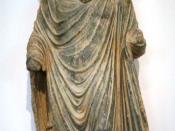To obtain a clearer statement of the significant issues that fashioned the moral and ethical values of the Buddha, the responder has to enquire beyond the spiritual context, and examine the historical. In this sense, the historian should not dismiss myth and legend as "historically implausible" due to the fact that the ethical values of these texts emphasize the motivational forces behind the actions of the figure. In the case of Siddhartha Gautama, it is relevant to approach these texts with a manner of edification, particularly when considering his influence and response on society.
There is a great deal of religious controversy surrounding the character Siddhartha Gautama and his life before "Paticcasam UppáºÂda" , the Chain of Dependant Origination, or essentially, the time of enlightenment. Dates of birth range from 624 to 368 BC, however, all texts agree that the Buddha "lived for eighty years and had a teaching career that approached five decades" .
Of particular relevance to his actions is the catalytic effect that poverty, death, disease and old age had on his moral perspectives.
Historical research tells that Gautama left home in search of salvation, however, regardless of prominent instruction, found no great "awakening". To further this, he maintained that truth remained "veiled in asceticism" , and that empty constraint accomplished little in life. Thus, through this rejection of aesthetic mortification and worldly pleasures, enlightenment was obtained and the middle path of salvation was revealed. As quoted by Gautama himself, this was the "voluntary exit from life, from the circle of sorrow; in a noble but entirely unparalleled act of renunciation of all- that such a teaching leaves little room for ambition - for self activated activity".
Incidentally, Buddha's perspective is viewed primarily on a spiritual basis. However, in regards to detail on the response of...


